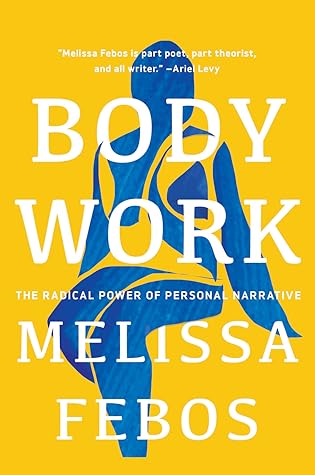More on this book
Community
Kindle Notes & Highlights
Read between
December 29, 2022 - January 18, 2023
There is no pain in my life that has not been given value by the alchemy of creative attention.
I’m finished referring, in a derogatory way, to stories of body and sex and gender and violence and joy and childhood and family as navel-gazing.
“Who here has experienced an act of violence, abuse, extreme disempowerment, sexual aggression, harassment, or humiliation?”
Expressive writing about trauma strengthens the immune system, decreases obsessive thinking, and contributes to the overall health of the writers. And this is after only four days of fifteen-minute sessions.
That these topics of the body, the emotional interior, the domestic, the sexual, and the relational are all undervalued in intellectual literary terms, and are all associated with the female spheres of being, is not a coincidence. This bias against personal writing is often a sexist mechanism, founded on the false binary between the emotional (female) and the intellectual (male), and intended to subordinate the former.
The resistance to memoirs about trauma is in many respects a reiteration of the classic role of perpetrator: to deny, discredit, and dismiss victims in order to avoid being implicated or losing power.
Today, I reject the patriarchy’s bad ideas. It’s a needed reminder that when I start to feel bad about my body or laughing too loud in a restaurant or start to wonder if I should shave my armpits, those are not my ideas. I like my body, laughing loudly in restaurants, and my soft armpit hair.
I’ve found that those of us fucking in the margins are often policed by our own communities to represent our sex in an idealized way.
The idealization and marketing of our marginalized sex experiences as wholesome and perfect is a great argument against the argument for our depravity. But it also erases so much of our humanity.
I have had plenty of folks tell me confidently that I could write anything I wanted about them. I have come to understand that what they actually mean is that I have their permission to write anything about them that they can imagine I might. People cannot give me permission to write the things about them that they cannot see. Or that they imagine I cannot see. We are all so much more transparent than we think.
Secretive people are often diarists, I’ve noticed.
People have always liked to read confessional work, and they have often liked to denigrate it as well. It was a popular style, then it wasn’t, then it was again.
When I say that I have no regrets, it might sound arrogant. What I mean is that I have returned to the parts of my past that pained me and uncovered the aspects that I most wanted to avoid. I have grieved and I have taken responsibility. I have revised the story of my victimhood and my culpability. I have completed what was interrupted, what stuttered like a skipping record for decades. I have brought to it my questions, like some oracle, made myself a supplicant to the past, asked her what I could not when I was her, and told her what she could not tell herself. Through this process, I have
...more


